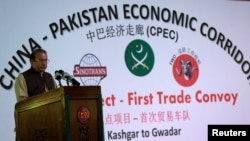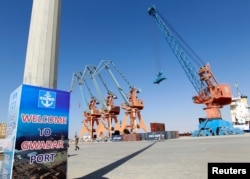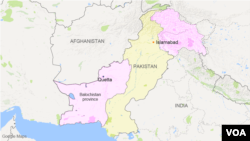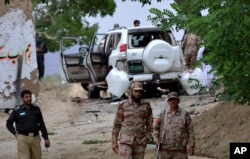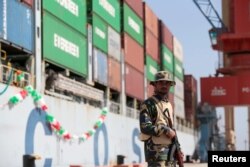For its proponents, a project to expand its port in Gwadar and link it to China as a way to provide jobs and an economic boost to Balochistan, the country’s poorest province.
To get it built and functioning, though, the government needs to undercut a separatist insurgency and a variety of militant groups that have used poverty to fuel the flames of insurgency, analysts say.
“If Pakistan is not able to control extremism in Balochistan, how could the government achieve the desired results it is currently portraying?” asked Hasan Askari, a prominent security and military analyst.
Gunmen on Wednesday kidnapped two Chinese citizens in Quetta, the capital of Baluchistan province, after intercepting a car carrying three Chinese, including two women. Police say they launched a major operation to find the Chinese nationals.
Baluchistan is at the heart of a $60 billion, Chinese-funded "Belt and Road" trade and development initiative.
The China-Pakistan Economic Corridor (CPEC) is a joint venture between the two countries that already is well underway. It will connect northwestern China’s Xinjiang region to Gwadar’s deep-water port in southwest Pakistan via a network of roads, railway, communications and energy projects.
China gets a shorter trade route to the Persian Gulf; Pakistan gets a second major port.
Pakistan’s Federal Minister of Planning and Development Ahsan Iqbal says CPEC is expected to be completed by 2030 with an initial investment of nearly $50 billion.
Pakistani officials are optimistic it not only will boost ties between the two traditional allies, but its backers say it will create around 2 million jobs, mostly in Balochistan.
Many security and military analysts, however, remain skeptical of the government’s portrayal of an aspiring future linked to CPEC without complete eradication of militancy in Balochistan.
Insurgents and nationalists remain actively engaged in launching attacks against “soft targets” — usually killing laborers from other provinces — and conveying a message that Balochistan is turbulent and not ready for long-term investments.
Earlier in May, unknown assailants opened fire on laborers building a road in Gwadar, killing 10. A day earlier, an Islamic State suicide bomber blew himself up in Balochistan, killing 25 people while targeting a convoy of prominent politician Abdul Ghafoor Haideri.
Recently a high-level security conference was held in the provincial capital, Quetta, underscoring the government’s concern over the recent violent incidents and to come up with a strategy to protect Chinese investments in the region.
Iqbal says the government is fully aware of the security concerns and is taking solid measures against it.
“A force of 9,000 security personnel under Pakistan’s Army has been deployed in Balochistan to provide a security cover,” Iqbal told VOA.
A special maritime security “Task-Force 88,” commissioned by Pakistan’s Navy, was introduced in December 2016 to protect the port’s sea routes. The military presence in Gwadar itself has been immensely increased.
“CPEC holds economic prospects for Pakistan, and it is our future,” said Sarfaraz Bugti, Balochistan’s minister for Home and Tribal Affairs. “The law-and-order situation has improved over the years in the province, and we’ll not let anyone [Baloch insurgents] mess with it.”
Azaz Syed, a senior journalist and author, says the challenge shouldn’t be overestimated because it has resisted change so far.
“The security pattern of Balochistan seems to remain intact and will not be changed in the near future,” Syed told VOA.
Experts believe the government also needs to develop a sense of belonging to the long-deprived residents of Balochistan.
“The local population needs to be assured they’ll be given priority in the new job opportunities [as it belongs to their province], this will eventually increase their stake in the project,” Askari told VOA.
In addition to CPEC, Pakistan hopes to benefit from China’s even more ambitious “One Belt, One Road,” a $1 trillion-dollar trade and infrastructure project to build a massive economic corridor connecting Asia, Europe and Africa through a network of land and sea routes.
Earlier this month, Beijing hosted 29 heads of state at a summit to discuss the project. Pakistani Premier Nawaz Sharif headed a high-ranking delegation to the summit, where Pakistan and China signed on bilateral agreements worth nearly $500 million.




